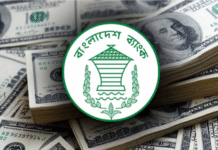

Amid a US dollar crunch in the domestic market, many banks failed to comply with the exchange rates set by Bangladesh Bank a couple of days ago.
Though the BB injected $123 million into the market yesterday, most of the banks were unable to settle import bills at Tk 89.15 per dollar fixed by it on Sunday, say officials of several banks.
The central bank has so far supplied a record $5.95 billion to the foreign exchange market this fiscal year tocool it off.
The Daily Star yesterday contacted seven banks to know whether they followed the BB-set exchange rates. Of them, five said they had no choice but to sell each dollar to importers for Tk 91-94.
The BB on Sunday also asked banks to offer exporters a maximum of Tk 88.15 for each dollar while purchasing export bills and Tk 89.20 for foreign exchange houses that channel remittances to Bangladesh from abroad.
The central bank fixed the interbank rate — the benchmark exchange rate of the taka against the dollar — at Tk 89.
No bank yesterday showed any interest in buying or selling the dollar through the interbank platform as they considered the interbank rate to be still lower than the actual market demand, managing directors of four banks told this correspondent.
The BB has so far depreciated the interbank exchange rate of the taka against the dollar seven times this fiscal year.
The latest large depreciation of the interbank rate came on Sunday when the BB devalued the taka by 1.25 percent to Tk 89 per dollar. The rate was at Tk 85.80 per dollar on December 30 and Tk 84.80 on May 29 last year.
Mashrur Arefin, managing director of The City Bank, said the BB yesterday supplied greenbacks to banks at Tk 89 per dollar to help them settle import bills.
“We have settled smaller import bills of below $1 lakh with the central bank’s support.”
But most of the banks settled large import bills at Tk 92-94 per dollar as they had to add risk management premium to the prescribed interbank exchange rate of Tk 89.15, he mentioned.
“Banks are running short of dollars … We settled the bills by adding risk management premium…,” he said.
Risk management premium is a charge that a client pays to a bank, which has to take the risk of depreciation of the local currency against the US dollar.
Every bank bought foreign remittances from local money exchange houses at Tk 89.20 a dollar. But two large foreign exchange houses — Western Union and MoneyGram International — sold the US dollar to banks between Tk 93.62 and Tk 95 per dollar, which was unfair, he said.
“This will ultimately render the BB directives ineffective. If we buy remittance at Tk 93-95 per dollar, how will we comply with the BB rules?” he asked.
He said no dollar transaction was made through the interbank platform yesterday as the banks had earlier bought the greenback for Tk 94-95 per dollar.
Syed Mahbubur Rahman, managing director of Mutual Trust Bank, said he was informed that some banks had sold the dollar to importers at Tk 92-94.
He further said some exchange houses had already reduced the rates in line with the BB directives, but some others were yet to follow those.
If all exchange houses follow the BB-fixed rates, the market will become stable. The BB should continue its supports by injecting US dollars into the market on a regular basis, he said.
“The central bank should issue a circular like it had done in the past so that all banks follow the rules related to exchange rates,” he said.
Ahsan H Mansur, executive director of the Policy Research Institute of Bangladesh, said the BB should observe the market trend for a week. If the exchange rates do not work properly, it should reconsider the rates.
The central bank should lift the 9 percent cap on all types of loans, except for credit cards, to restore stability in the foreign exchange market.
Interest rate on post-import financing, which is now 9 percent, will go up sharply if the central bank withdraws the cap, said Mansur, also a former official of the International Monetary Fund.
Higher interest rate on post-import financing will help contain the soaring import payments, he observed.
Post-import financing is a short-term loan that the importer takes from a bank to make import payments.
A BB high official, involved in managing the foreign exchange reserves, said it will take time to bring stability to the forex market.
“We are now cautiously monitoring the market. The central bank will take measures in the light of the market situation,” said the official seeking anonymity.
Bangladesh’s foreign exchange market has been facing an acute shortage of the dollar over the last couple of months as prices of commodities have gone up in the global market, pushing up the country’s import payments to a large extent.
The Covid pandemic initially disrupted the global supply chain, which worsened further after Russia’s invasion of Ukraine.
Bangladesh’s import payments stood at $61.52 billion between July and March, up 44 percent year-on-year, while exports grew 33 percent to $36.61 billion.
The large import payments created a record trade deficit of $24.90 billion in the first nine months of the current fiscal year ending in June.
The reserves stood at $42.29 billion on May 25 this year in contrast to $46.15 billion on December 31 last year.









